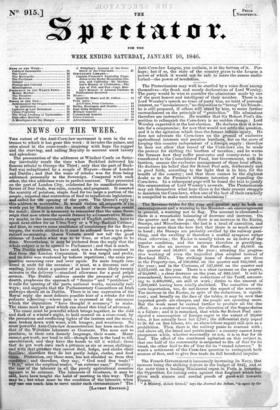The Revenue-tables for the year and quarter may be both
an encouragement and a warning to the Minister—an encouragement to proceed, a warning not to flag. The account is checkered— there is a remarkable balancing of decrease and increase. On the quarter and on the year, there is an increase in the Excise, Stamps, and Miscellaneous: the last is a head of casualties, and means no more than the bare fact that there is so much money in hand ; the Stamps are probably swelled by the railway gam- bling, and the swelling is therefore a morbid symptom rather than otherwise ; the Excise is usually taken as an index of the popular condition, and the increase therefore is gratifying. There is also an increase on the Post-office, of 43,0001. on the quarter and 56,0001. on the year ; attesting the progres- sive working of even the imperfect plan adopted instead of Rowland Hill's. The striking items of decrease are those in the Property-tax, of 100,0001. on the quarter and 186,000/. on the year ; and in die Customs, of 547,0001. on the quarter and 2,273,0001. on the year. There is a clear increase on the quarter, of 95,0001.; a clear decrease on the year, of 633,5501. It will be remembered, however, that the reductions of the Tariff, amount- ing to 3,400,0001., are still at work ; duties to the -amount of 1,300,0001. having been totally abolished. The casualties of the corn-importation, too, do not favour the aspect of the accounts. The increase in the Excise, in spite of the reductions, is signifi- cant; and broadly on the face of the tables, it may be seen that imported goods are cheaper, and the people are spending more. But the work must be carried further to produce all the due effect. As a matter of revenue, the alteration of the Sugar-duties is a failure ; and it is remarked, that while Sir Robert Peel anti- cipated a consumption of foreign sugar, to the extent of 20,000 tons, it has actually been but 2,700; the differential duty (equal to 9s. 6d. on free labour, 48s. on slave-labour sugar) still acts as a prohibition. Then there is the railway panic to contend with ; and above all, the bread and potato'panic : a country cannot keep prosperous while, whether reasonably or not, it is Li; fear for its food. The effect of the continued agitation on this subject is, that one half of the community is subjected to fits of fear for its bread, the other half to fits of fear for its "vested interests." It wants a settlement of the Corn-law question to extinguish both sources of fear, and to give free trade its full beneficiatimpulse.


























